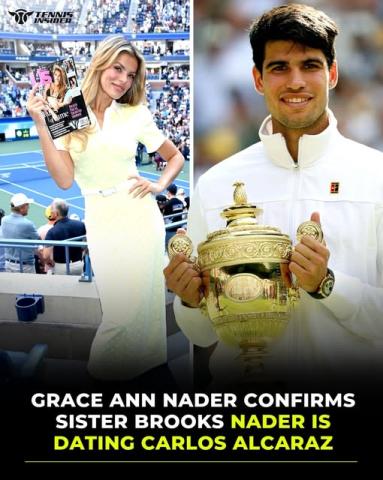
The tennis world has a new superstar, and with that title comes a level of scrutiny that few 20-year-olds can truly comprehend. Carlos Alcaraz, with his explosive game and infectious smile, isn't just playing tennis; he's living under a microscope. Every forehand winner is analyzed, every loss is scrutinized, and now, his life off the court is becoming front-page news.
Recent reports from publications like Page Six and confirmations from model Grace Ann Nader have sparked a media frenzy, announcing that her sister, Brooks Nader, is in a relationship with the Spanish phenom.
This has led to a predictable, and often cynical, chorus of predictions from certain corners of the fanbase: "This is it." "He'll lose focus." "His game will massively decline."
But before we write the narrative of a downfall, let's pause and apply a little perspective.
The "Distraction" Narrative: A Tired Trope in Tennis
History is littered with the whispers of concern whenever a young athlete's personal life becomes public. The assumption is that any relationship, any life outside of the sport, automatically detracts from the singular focus required to be the best.
This is an outdated and overly simplistic view.
For every example critics might try to use, there are counterexamples of champions who thrived while building a life off the court. Roger Federer, Andre Agassi, and Steffi Graf all maintained legendary careers while in high-profile relationships. A happy and stable personal life can often be a source of strength, not a distraction. It can provide balance, support, and an escape from the immense pressures of the tour.
What Truly Dictates a "Decline"?
If we are to have a serious conversation about what could impact Alcaraz's performance, we should look at tangible, proven factors, not tabloid headlines.
- Physical Health: The foundation of Alcaraz's game is his breathtaking physicality. Any decline would more likely be tied to injuries—a recurring issue he has already managed—than to his personal life. His team's ability to keep his body in peak condition is paramount.
- The Target on His Back: He is no longer the hunter; he is the hunted. Every player brings their absolute best against a reigning Wimbledon and two-time Grand Slam champion. The strategic analysis of his game by opponents is more intense than ever. Adapting to that is his real challenge.
- Mental Fatigue: The grind of the tour is relentless. The pressure to defend points, the constant travel, and the media obligations are what truly wear on a player's mental focus. This is a battle every champion must learn to manage.
- The Evolution of Rivals: Novak Djokovic remains the ultimate benchmark. Jannik Sinner is improving at a startling rate. The competition at the top is fiercer than it has been in years. A "decline" in titles could simply be a reflection of a more competitive field, not a decline in his own ability.
The Bottom Line: Trust the Champion
Carlos Alcaraz has shown, time and again, a preternatural maturity for his age. He possesses a deep, innate love for the game and a fierce competitive spirit that isn't so easily extinguished.
To suggest that a personal relationship alone will cause a "massive decline" is to underestimate his professionalism, his support team, and his champion's mindset. His focus on the court has always been his defining feature, and it is naive to think he would simply abandon it.
The narrative of his career will be written by his forehands, his drop shots, and his fight on the court—not by the gossip columns. The true test of his greatness will be how he navigates the entire ecosystem of being a superstar, which includes managing his public and private life.
Let's judge Carlos Alcaraz by his results between the lines, not by the headlines beside them.
